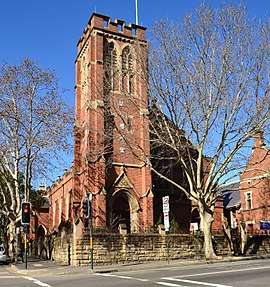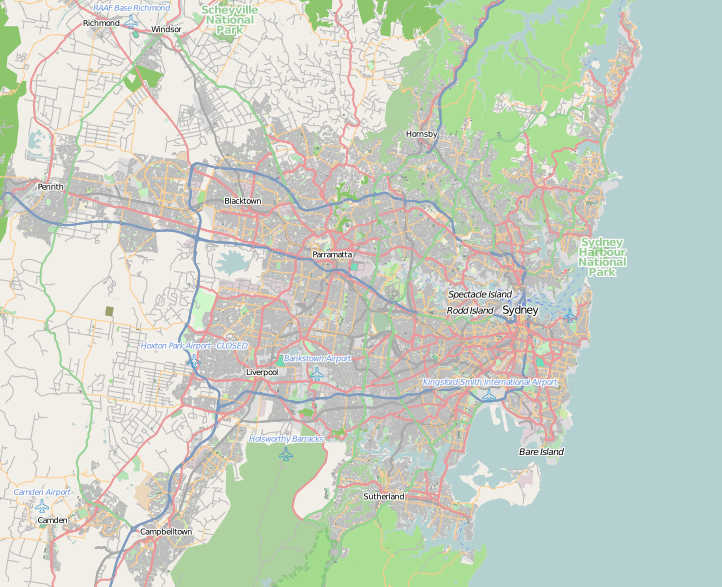Chinese Presbyterian Church
The Chinese Presbyterian Church, also commonly known as CPC, is a Presbyterian church at the corner of Crown and Albion Streets, Surry Hills, in Sydney, New South Wales, Australia. The church is reputedly the oldest surviving Chinese church in Australia.[1] As at 2017, the church had a congregation of just under six hundred people meeting in worship services catering to languages of English, Cantonese, and Mandarin, and primarily seeks to reach out to the Chinese community of Sydney.
| Chinese Presbyterian Church | |
|---|---|
| CPC | |
 Chinese Presbyterian Church, Surry Hills | |
 Chinese Presbyterian Church Location in Greater Sydney | |
| 33°53′01″S 151°12′52″E | |
| Location | Corner of Crown and Albion Streets, Surry Hills, New South Wales |
| Country | Australia |
| Denomination | Presbyterian |
| Website | www |
| History | |
| Former name(s) | Fullerton Memorial Church |
| Status | Church |
| Architecture | |
| Functional status | Active |
| Architectural type | Church |
| Administration | |
| Parish | Surry Hills |
| Presbytery | Sydney |
| Synod | Eastern |
| Clergy | |
| Minister(s) | Rev. Chris Chan |
History
The first Chinese churches arose out of the gold rush of the 1860s in Victoria, to where numbers of migrants travelled to make their fortune. The Chinese Presbyterian Church can trace its foundation to the Presbyterian Chinese Mission formed by the Presbyterian Church of New South Wales as Sydney became an increasingly important centre for Chinese immigrants.
Location
The Chinese Presbyterian Church officially began in 1893, opening its first church building on Foster Street in Surry Hills. Its first clergyman was John Young Wai.[2] The church moved to Campbell Street in 1910, then moved to its current location at the Fullerton Memorial Church in 1957, located at the corner of Crown and Albion Streets.[3] Today the church continues to worship at the Fullerton Memorial Church building and owns and uses various adjoining properties for ministry. Currently the moderator of the church is Rev Christopher Chan who succeeded Rev David Tsai after he had retired from moderatorship in 2016.
Relationships with other Chinese Churches
In 1964 four elders left CPC to form a new church at Milsons Point, the Chinese Christian Church, also known as CCC. It began as an 'inter-denominational' church based on Congregationalist church government principles.[4]
Cornerstone Presbyterian Community Church was planted in Concord out of Chinese Presbyterian Church in 1992 with a group of 30 adults. In 1994, Cornerstone was constituted as a pastoral charge separate from the Chinese Presbyterian Church. The Cornerstone churches currently number three congregations, with plans to expand further.[5]
GracePoint Chinese Presbyterian Church began as a church planted in Burwood by CPC in 1998. The church partnered with the St James Presbyterian Church at first, becoming independent only in its second year, and was originally named Burwood Chinese Presbyterian Church. As the church outgrew its location, it sought out another place for a church building. In 2010, the new church building at Lidcombe was successfully built and was also renamed as GracePoint Chinese Presbyterian Church.[6]
Challenges for the future
CPC faces challenges in considering and redefining its place as a Sydney Chinese church as at 2011 due to a slow but inevitable trend over the last several years for church members with growing young families to seek local Chinese churches as closer and more viable alternatives for Christian community. In addition, the presence of increasing numbers of local Chinese churches, of which some are not related to CPC in origin, mean that the Chinese Christian community is becoming more locally defined and decentralised from what was once a few large Chinese church communities. Increase in local outreach focus in the Surry Hills area is one such solution, including a focus on international expatriates and young working professionals working and living in the Surry Hills area.
References
- So Great A Cloud Of Witness. Chinese Presbyterian Church. 1993. p. 1. ISBN 0646138340.
- Chan, Adrian. "Young Wai, John (1847–1930)". Australian Dictionary of Biography. Melbourne University Press. ISSN 1833-7538. Retrieved 18 February 2012 – via National Centre of Biography, Australian National University.
- Jupp, James (2001). The Australian People: An Encyclopedia of the Nation, Its People and Their Origins. Cambridge University Press. p. 210.
- Mar, W. L. (1993). So great a cloud of witnesses: A history of the Chinese Presbyterian Church Sydney 1893–1993. pp32-33. Surry Hills: The Chinese Presbyterian Church.
- "History". Archived from the original on 18 June 2012. Retrieved 27 November 2016.
- "Archived copy". Archived from the original on 22 July 2013. Retrieved 27 August 2013.CS1 maint: archived copy as title (link)
External links
| Wikimedia Commons has media related to Chinese Presbyterian Church, Surry Hills. |